Talking about characters from movies/books/comics that I think are neat while trying to write
Last active 60 minutes ago
Don't wanna be here? Send us removal request.
Text
To the anon that made the comment about giving me their life/soul when I make the Jerry analysis essay, did it get lost in the mail? I have been waiting for it for a while and haven't gotten anything. Give it to me now, chop chop
3 notes
·
View notes
Text
My Eltingville Club Crackpot Theory/Speculation
(I was thinking about this for a while but not sure if this falls under the misogyny argument. If it does, think of this as part 1/2)
I was thinking a lot about the Eltingville Club and how they became the way they were. In this case focusing on a very hyperspecific one rather than a broad summary.
In this case, this mini-essay will be less based on concrete details of the comics and more asking people to put on their tinfoil hats and listen to my crackpot theory. That being said, The Eltingville Club can be viewed through the lens of the failure of American sex ed, as well as adults not having an eye on their kids and the content they look into, all folding into how it warps their opinions on women and relationships.
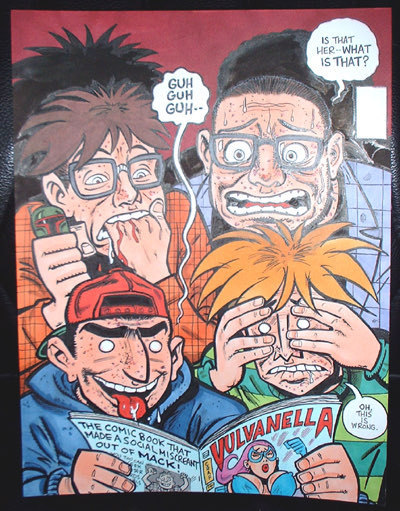
There isn’t any information given on the school itself aside from characters like Bill being victims of bullying, but the US is mainly known for being shit when it comes to discussions of any type of sex ed, mainly because of the prioritization and emphasis on abstinence and scaring kids with STDs rather than actually talking about the topic itself.
* *The goal of being able to reduce sexual behavior through abstinence fails because it doesn’t actually delay said behavior, it just comes with the add on of reinforcing harmful gender stereotypes and people having no clue how their body works without it in a sexual context.
* **Also add in the context of Eltingville being a small suburb area, so these characters are stuck in a small town with nowhere to go aside from a comic shop, and probably social pariahs by everyone else not in their group of nerd friends.
It’s clear that the parents of the Eltingville Club aren’t really involved in their kids lives. Bills mom is a single mother and also implied to be abusive, Josh’s parents spoil him and lack personal responsibility for their actions, Pete’s parents both abuse and neglect him, and Jerry has neglectful parents as well. Aside from surface level, their parents don’t really want their children in their life, or wish that they were different from not meeting their expectations.
The only other adult in their life aside from their parents is Joe, who only lets them stick around because of the amount of money they drop on comics and collectibles in the store. His first appearance shows him selling adult content in the form of trading cards to children (maybe 10 years old), he doesn’t really care what he exposes to anyone of any age because the only important thing to him is profit.

From this, I would argue that Joe played a role in their lives by encouraging the club to look into content they shouldn’t be looking into, and because it is alongside content they already enjoy, it makes it easier to consume and gives them the desire to have more of it.
I partially bring this up because a lot of the stuff Pete is interested in (such as the gore/rape clips and gory comics) isn’t just something you find in the open, you have to go digging for it, and I wouldn’t be surprised if Joe was involved in helping to find said content/expose it to him.
With all of the factors combined, it has left the club brain rotted with a warped idea of women, specifically being that women aren’t actual people but just eye candy and mechanisms for pleasure while also having no fucking clue about sex itself (body parts being referred to as things or characters being confused at what the hell the comic is portraying come to mind.)

Joe can take part of the blame considering he has unrestricted adult content in the open, but he was probably not the sole cause of the characters turning out the way they did, again this is more of a tinfoil hat theory, it could have happened from chat forums or a variety of other things, this is just something that has been on my mind for a while.
Credit to @sapphicsandman for this as well, I referenced a lot of the things he had to say on the topic, so this did not come from my brain alone.
#the eltingville club#character analysis#bill dickey#josh levy#pete dinunzio#jerry stokes#eltingville club
50 notes
·
View notes
Text
Character Analysis of Josh Levy
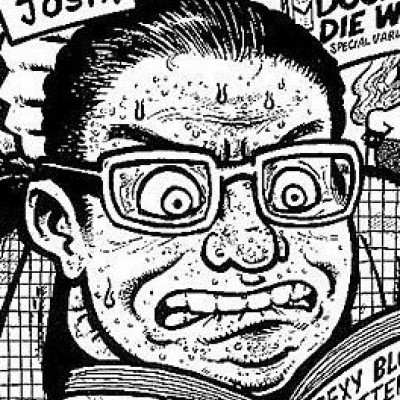
Sorry if this is shit, idk how to word my feelings on Josh. Gonna go about each character very differently bc they're all complex in their own right and I have so many thoughts. Brain so full. He’s the most tragic of them all, super overlooked, misunderstood, and underrated. He’s someone who’s hard to analyze, since he’s so guarded. Plus I distance myself from him bc he's too real lol
I feel the most integral part of Josh's character is the fact that he's neurodivergent. He's always been very autistic-coded in writing, but it was also confirmed by Dorkin that he is somewhere on the neurodivergent spectrum, which changes his character completely from just a gluttonous selfish loser to a cautionary tale of what can happen when autistic children get no resources or room to be "weird" in public.
When we first meet Josh, it's established that he's the laughing stock of the group. In the first meeting that we see, the rest of the club has managed to get all types of pop culture merchandise from all over the place, but Josh's are more childish, like Animaniacs and Flintstones. He also went the easiest route, basically relying on his mother if he wanted to get anything done. All in all, not very complex, and this gets him laughed at immediately.
He is only treated with respect when he has something the rest of the club values, and has to use it as leverage to get any kind of positive feedback. During open debate, he's almost sneered at by the rest of the group and doesn't even realize it, since he's loud and corny and laughs at his own jokes. When they play DnD, he's shown to be very insecure and terrible at decision-making, once again getting him endlessly shit on by Pete. And once his leverage is gone, he's mocked again, especially for falling for such an easy scam.
There is a lot to unpack there, very quickly. The story almost makes it easy to point and jab at someone like Josh, without looking much deeper than the surface. He's the Eltingville Club's personal Chris-Chan, or Tophia, or Daniel Larsen.
Josh Levy has a Binge Eating Disorder
Josh has bad eating habits, both in the comics and pilot. He's willing to eat stale Doritos from a trash can, is constantly shoving fast food in his face, and bulk buys food constantly for the collectibles, eating it all instead of throwing it away like his friends. It even leads to health problems and discomfort, like when he was eating nothing but Batman-shaped Mac and Cheese for days and had extreme bathroom issues. This is meant to show his gluttony, but even that represents the issue Josh has faced all his life - his problems being portrayed as his own fault and made into a gag. Being fat is not a moral failure, but everyone has always told Josh that it was.
Binge eating stems from somewhere. You aren't born with those habits, and there's a reason he feels stupid and ashamed every time he participates in it. Josh has always faced a lack of control and emotional support from everyone in his life, leading to him trying to find it in both escapism and food binges. It's also a sign of even bigger mental health issues, but no one steps in. His own family shows a lack of care or consideration for their son, along with enabling his habits by constantly buying more for him. He has very little say in his own life, but he does at least have a say in how he eats and the things that bring him joy, even if it's destroying him.
Enabling Parents
While I wouldn’t say Josh has good parents, they at least have some type of care for him, and he obviously comes from a family with money. His parents are very old, and his mother is sickly, which means that they probably can’t discipline him in the way that he needed as a child. Even when Josh was grounded, it was a very light punishment compared to what he did (literally vandalism) and it’s clear there aren’t many rules in his house.
They essentially allow Josh to do whatever he wants, and throw money at him constantly, but refuse to actually look at what he needs emotionally that is causing all these outbursts. They show very little care when Josh is distraught, don’t address his binge eating habits or obsessions or why he’s having dreams of his friends beating him to a pulp. They constantly buy him a bunch of junk food when they can see the impact it’s having on his health, or maybe they don’t pay enough attention to notice. With his mother being sick, it’s very likely that he didn’t get much attention, and tried to get it from everywhere else in his life. He’s emotionally neglected and physically spoiled, trying to use material possessions to fill that void.
Josh’s Autistic Traits
I’m going to have to make a bullet pointed list for this, since there’s so many instances that it’s hard to pinpoint all of it.
Emotional Outbursts/Emotional Impermanence - Josh has been shown on multiple occasions to feel things very strongly, and acts out because of how emotional he gets. Particularly, his anger often overwhelms him. It’s very common for people on the spectrum to lack the ability to regulate their emotions and self soothe in a typical fashion, which leads to meltdowns, and angry outbursts. Josh clearly has a hard time conveying what he’s thinking when he’s upset, often getting tripped up and desperate, like trying to explain himself during the trivia-off, and trying to set boundaries with the club about the fat jokes only to be met with laughter and ridicule. I firmly believe he’s had meltdowns multiple times on screen, and it’s not always just him throwing a tantrum. He’s also able to switch his emotions very quickly, going from fuming with anger to beaming with joy, as if he’d felt nothing else beforehand.
Social Obliviousness - Josh often doesn’t realize he’s the butt of the joke when it’s not spelled out for him. His friends don’t even want to be seen next to him at times, and he never really realizes the degree in which they hate him. He makes a fool out of himself constantly, but doesn’t realize how people perceive him OUTSIDE of being a fat nerd, and has no desire to know and no self-reflection. Once again, I feel that the dream he has about his friends beating him up until he bleeds is significant, because he asks himself “what could that possibly mean” when it is VERY obvious to the rest of the audience.
His Special Interests Shape His World - Josh isn’t shown to be the brightest in many aspects; in the pilot he’s prone to making mistakes, he often comments in the comics about how he comes to realizations far slower than the rest of his friends. But when it comes to his special interests like Star Wars, he’s a human encyclopedia. He knows the most out of the group about anything sci-fi and comic related, even trying to build an actual functional Iron-Man suit by himself (before lighting himself on fire, but that’s still knowledge and dedication). The way he calms down is literally sorting his figure into lines. He can’t take his mind off of it even in important situations, like in the pilot when he’s being screamed at by Bill’s mom but is still caught up in the DnD game. His job in the future is literally him trying to be a comic writer. He cannot function in the world without his special interests being involved, and since most people were very hostile towards him and his interests, this manifests in him being defensive and obsessive instead of forming a normal relationship with it.
Lack of Empathy - Josh is very rude, like everyone in the club. While his harassment of others isn’t an autistic trait, it does show that he has a hard time putting himself in other people’s shoes. Even when he does care about people, like his mother, or Bill not getting a chance to get a Star Wars figure because Josh keeps hoarding them, or Pete after the zombie walk, he can’t conceptualize how they feel if it doesn’t affect him. It may not even dawn on him, because of his social ineptitude.
Missing Social Cues - Josh isn’t the best in social situations; from the painful conversation with the many cashiers at fast food places, to the scene during DnD, in the comics, when Josh is confronted with a social interaction with a girl and completely falls apart. He’s awkward, he’s loud, and he has no idea he’s awkward and loud. He’s also very blunt, and sincere with his words, not realizing that other people can say something and mean another, like when he showed up to job interviews and talked about Godzilla, thinking the hiring manager was interested.
Black and White Thinking/Paranoia - Josh jumps to conclusions often. With him, it’s either something is the worst thing to ever exist, or it’s perfect and you’re not allowed to criticize it. He has a hard time understanding that grey area, and this also reflects on how he views other people. Unlike Bill or Pete who form their judgements of “normies” on trends they’ve noticed and behaviors they’ve watched from afar, Josh thinks they’re all inherently bad based on his own experiences being bullied. And he believes all nerds are inherently better because of his friend group and experiences. Seeing someone who’s both preppy and enjoys nerdy media would probably turn his entire world view upside down.
Disorganization/Executive Functioning Issues - Josh can’t care for himself on his own, and has a hard time in public places. In the pilot it’s more evident, during the DnD game when he’d been shown to drop everything, make poor decisions, be hyper focused on small issues and details while ignoring the big picture, which can reflect how he conducts himself in real life. Even just making himself a meal or going grocery shopping is hard for Josh, which can be partly caused by his parents babying him too much, and partly from lack of executive functioning skills.
The Lolcow-ification of Josh
Unfortunately it’s a big part of his character stereotype that this story takes place in the early 2000s, which means the general population is very hostile to both fat people AND autistic people. Being both means that anyone and everyone will find an excuse to shit on you, and it will be socially accepted to do so. So it’s not unreasonable to assume Josh has been socially outcasted since his birth. Social Isolation is scientifically the worst pain humans can go through as a social species - it manifests in the brain as physical pain. And being exposed to that pain your whole life leaves you traumatized.
I’m going to be a dork for a second and reference my favorite book; much like how Frankenstein’s monster was not born violent, but grew to be so after being rejected and betrayed by everyone he knew, Josh‘s positive traits slowly became overshadowed by his insecurity and defensiveness.
It’s rather heartbreaking, how hard it is to analyze Josh when he is so clearly defined by trauma. Especially since it’s a fact that no autistic person in our society has really gone without trauma. It’s hard to know the real Josh when he’s always on defense mode. His trauma is also heavily overlooked, both in the story and in reality. Since he is most likely undiagnosed, he probably sees it as his own fault.
Josh’s Positive Traits
When he’s so often looked down upon, I feel like it’s important to have a little segment all about the good things in Josh that’d hard to notice.
Creativity - Josh is actually very imaginative. From his desires to become a comic writer, to his eagerness during the costume contest, he’s shown a desire to create and is always full of ideas. Good ones? Maybe not. But full of ideas nonetheless.
Loyalty - Josh puts up with shit no one in the whole world should let slide. When Josh truly loves someone, like the club, he doesn’t leave them. It may be partially caused by his follower tendencies, but he’ll stick by and defend his friends in any situation. Even when he swears he’s leaving for good, like when he daydreams of shooting his friends in the head, or claims the end of the Eltingville Club in the pilot, he always comes back.
Attention to Detail/Ingenuity - Josh is the type to notice things no one else notices, which often comes in handy, like during the trivia-off and how he managed to make the stash of collectibles in toy stores for the club. It’s an important skill, especially when the rest of the club doesn’t pay as much attention is he does. He tends to take the long way when solving problems, so this attention to detail often means coming up with unique solutions to difficult problems.
Honesty - Josh says what he means, which is real as fuck. Saying he’s gonna piss his pants in excitement is not only humorously blunt but also goes to show that he’s not gonna hide what he thinks or how he feels for anyone. The type of friend you go to when you want someone to tell you how it is and not sugarcoat it.
——
Yeah that’s all I’ve got for now. Too many thoughts and too little words I may explode. I just wanna squish him
#the eltingville club#josh levy#the analysis regarding Josh and his neurodivergent behaviors#I love it chefs kiss#looking forward to what you have to say on Bill and Jerry
303 notes
·
View notes
Text
Character Analysis of Pete Dinunzio (Comic Vs. Pilot)
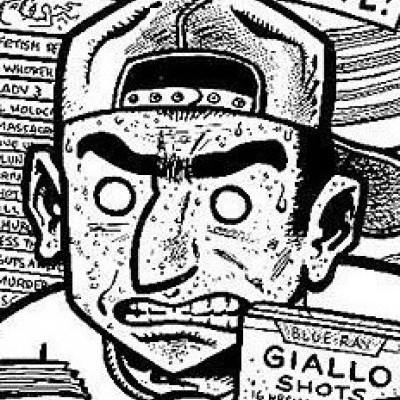
Disclaimer: This is by no means a very good or professional analysis or anything, this is just me whipping out my Honors English high school powers for fun, to put these guys in a jar and shake them. Getting as much content out of this comic as possible even if it means yapping. Pete goes first because he's easy, lol
The Comics Highlight His Flaws
The first difference I noted when watching the pilot first and then delving into the comics is; Pete is aggressive. Much more aggressive. He's the most argumentative member in the first few panels, with most of his comments being rather pessimistic or sexual in nature. He always has some sort of retort or comeback to defend himself and his views, and his passions come out mostly in anger.
There's also a silent shame that comes with his behaviors, much more likely to complain about what he doesn't like than happily explain what he's passionate about. When he does have passionate moments, it's because these things that make him very vulnerable are being criticized, and he gets defensive. Like his love for Christopher Lee.
Without any prior knowledge of these characters, it can be assumed that Pete comes from an abusive household. His behaviors are major signs. He's most likely so combative because he's used to constantly being under fire, especially with (I think) 8 other siblings who are implied to be mostly older men. If he didn't have a slick comment or keep up this "tough" persona, he'd be their personal punching bag - figuratively and literally.
All Pete really knows is aggression, being canonically the poorest member (he states that he couldn't even afford to be in the Boba Fett conversation in the comics). It's been shown that the club lives in a shitty area in Staten Island. Plus, they're heavily bullied. It's shaped the way he communicates and interacts with the world around him. Even his obsessions - he likes seeing people get ripped apart to the point it becomes a kink.
Even the way he speaks sets him apart. Not necessarily his accent, but his word choices are usually much simpler and his points are very blunt. He's not portrayed as booksmart, and his swagger comes off more as a performance (both of masculinity and of nonchalance) than a natural way of being.
It's also worth noting his position in the very first panel of the comics. Bill is head of the table, of course, it's his house and he's the leader. (I'll get to that symbolism in Bill's analysis). But Pete is sat right next to him, lower than Bill and somewhat distant from him, but still seeming closer and getting more focus than Jerry and Josh.
His position is meant to draw your eye from an artistic perspective, he is unconsciously trying to secure himself a good spot for control and stability. If you're on Bill's bad side, you end up like Josh (I'll get into the lolcow-ification of Josh later on too), but Pete gets the least shit from Bill. Pete is not a pushover, and he feeds into Bill more. Their bickering seems almost comedic.
Totally different dynamic than he has in the pilot, so them getting along so well may be retconned. He has much more of a moral compass in the pilot, and while both versions show Pete *attempting* to be a mediator and a voice of reason, the pilot shows it more. Almost like Pete didn't want to be there, much preferring Jerry's company since they were both reasonable.
Bill and Pete's dynamic also goes to solidify Pete's relationship with his father and the toxic masculinity he displays constantly. Pete has the urge to stray and separate himself from the obviously immoral tendencies of his father, but still seeks approval from an authority figure in which he admires. Someone he sees as "cool" and capable, teeter-tottering between loving him and fighting him. His father is very authoritative, Pete was never allowed to question anything. He associates anything "girly" with pain - like how Bill associates women with sexist stereotypes, expecting to be hurt by them because of their shared experiences with bullying and Bill's mommy issues. Except Pete had it literally beat into him.
Him connecting masculinity to being capable and independent leads directly to his tendency to make choices on the fly. In a house that's always arguing, someone has to make a decision. And Pete wants to be seen as the macho man who knows what he's doing, but also doesn't care that much. So he mainly makes decisions with common sense, emotion, and whatever he's compelled to. A very "pull yourself up by the bootstraps" mentality from living in a conservative household.
Though I do feel that most of his decisions come from a place of shame. If you're secure, you usually don't have to make it a point, or brag about it, or defend it so vehemently. You just... are secure. This directly ties into his canonical bisexuality along with his horror passions. His whole life he's been told everything about him was fundamentally wrong, and he's trying to run from it. Which is why he tries to separate his personal love for horror makeup and SFX from traditional gay and drag art forms. Those things are looked down on. He hates being looked down on. Which is why he uses gays, along with Josh, as scapegoats.
The Pilot Highlights His Positives
From the first 25 seconds of the pilot, Pete is already a more positive version of his comic alternative. He's more successful in diffusing the bickering between Josh and Bill, and is more level-headed and goal-oriented. He's calmer, seeing things go wrong and actually wanting to find solutions instead of dwelling on the small details and who-did-what. He almost feels like a disgruntled mother with more humor. His independence also shines, but so does his tendency to run into danger without thinking.
Pete also sits much farther in the pilot at their meeting table. He's at opposite ends of the table, like the other head, or leader, willing to criticize Bill and never really seeing eye-to-eye with him. He tries to lead before Bill does, starting with the "Sexy Sirens" tape, and has a little bit of a power struggle. He's leaning back, to distance himself, and his nonchalance is more natural, it's just who he is. Josh and Jerry seem closer to Bill than Pete is, which is a total 180 from the comics.
A big point of Pete's character in the pilot that isn't touched upon at all in the comics is his sense of justice. He wants things to be fair - from the trivia-off in Joe's shop, to the DnD game. He tries to break up fights but will hit back if he's being hit, or someone else is being hit unjustifiably. Much like a shephard dog instead of a guard dog, like his comic alternative. But only to the club, he's still a menace to his general environment.
His trauma is shown more subtly but it is still made a point - while Pilot Josh is unconcerned when Bill's mother is yelling at the club, Pete seems the most worried and distraught, the first to start sweating and holding his head. His body language screams abuse. His introduction panel also shows he's relatively used to beat downs, seeming silently resigned and defeated rather than horrified like the other characters.
His sexuality also seems more on-par with a teen boy and less hypersexual, and there's less sexist comments. He's definitely still a little freak, shown with his creepy little faces, clawing at the glass, and his comments about "Battle Broads" the series, but he's not trying to repress nearly as much.
Combining the Two
Since the point of the comics was to be an exaggerated version of real life incels, I'd say the pilot is a more realistic representation of who Pete is as a person. But with such a short run, it didn't get to show the entirety of his character, which would have to be fleshed out across multiple episodes. The comics is a satirical piece mocking and displaying the worst of the worst, and t pilot is a commentary on the societal failures that lead to children with this kind of behavior.
There are some parts where they undeniably intersect though. Like Pete's tendency towards violence to solve his problems, and one specific comic panel (which I can't exactly find right now) where Pete comments that sewing's for sissies, and Jerry insists that he's not. Pete's reply is "Of course not you, Jerry, you're a wizard. Keep it up." This can be seen as him just wanting his clothes repaired, but it can also be interpreted as Pete putting his own insecurities and internalized feelings aside because he loves and respects his friends too much. It shows that he doesn't actually believe what he's saying to the degree he insists. Pete is the second most likely to have the capacity to change his ways, if he ever so chose.
Honestly, it's up to interpretation how these traits are combined. Some fans like the comics more, some fans like the pilot. Though Evan seems to be leaning more into the pilot interpretations of the characters now than the comics, showing a possible reboot or retcon of their old traits, just like the retcon of Epilogue Pete.
Summary (MBTI, Enneagram, etc.)
I'm gonna use my general knowledge of personality quizzes to get my point across, lol.
I honestly believe his MBTI is ESTP, as someone who studied it for a very long time and spent way too long on PDB. But he is a very unhealthy ESTP that never found an outlet for his more creative attributes, and lives in unhealthy environments that disrupt his peace.
On the good side, he can adapt easily, read his environment and the people in it well, and he is extremely passionate. He's pushed by his love of horror and film, seeking out people with the same interests and motivation to get things done. He's very experience-based, seeking out adventure, and has a lot of energy. He's very down to earth, lives in the moment almost too much, can easily improvise and comes up with decisions very quickly. He's a quick thinker, but thinks after he acts, not before, and is very life-smart. He's a good communicator, he's practical, hedonistic, and fair.
Deep down, he seeks validation from his peers, wanting to be seen as competent, talented, valuable. At his best, this helps him connect with others in a meaningful way like he craves. But he never really gets there, which leads to him forming a persona he believes will get him that respect. He's actually a very sensitive person in that way, not necessarily emotional but very touchy when it comes to what he loves. He's prone to pessimism, doesn't think about the consequences of his actions, and doesn't see himself in a world in which he's truly successful.
He's selfish, rude, doesn't trust others, has an intense aversion to rules, and doesn't look at any information that goes against what he believes. He can be bossy at times, or judgemental of others who don't meet his standards, and doesn't keep other people' feelings in mind. This leads to an internal struggle with seeing everyone as fake or not as dedicated, but also wanting, needing connection with other people. This can lead to him being rather conspiratorial, which leads to the whole "Jock vs. Nerd" conversation.
I also think he's a sp/so (self-preservation social) 8w9. His biggest fear is being hurt and betrayed by the people he loves, so he seeks out control and stability so that can't happen. He tries his best to be self-reliant so he has no need to open up to others and make himself vulnerable, and he's hard to warm up to. But once he likes you, he's loyal for life. He isn't very loud about these traits, trying to maintain an air of calmness while also being no-nonsense. He doesn't want to lose control of his anger, but also has a tendency to do so, leading to small outbursts of strong aggression. While he craves connection, if he has too many failed relationships, he may start to see them as a waste of his time and become very introverted, like how he became in the epilogue.
__
Yep, that's it, enough yapping for me. Those are all the things I noticed, hopefully it's entertaining to somebody lol.
#the eltingville club#pete dinunzio#character analysis#Oh my god oh my god it’s so cool to see another analysis post of the characters!#I love all of this I think they did a much better job at analyzing Pete than I ever could
524 notes
·
View notes
Text
Something I rarely see talked about is the fact that, at least twice in the first movie alone, Toothless helps Hiccup set boundaries or get the respect he feels Hiccup deserves.
He didn't start flying peacefully to show Astrid how nice it can be until after she apologized for being mean and threatening to tell the village. And when she did, Toothless almost immediately relaxed and arguably showed off. Like he was saying "look at this. Look at us. Look at what you'd be breaking apart and missing out on."
And, even if he didn't know the full story or reason, Toothless knew Hiccup and Stoick had a fight and Hiccup was upset. So he didn't show Stoick that Hiccup was alive until after he apologized for hurting Hiccup and starting that massive fight in the first place. In that scene, if you look at Toothless's eyes, you can tell he's waiting for something. And the second Stoick apologized, Toothless softened and opened his wings.
Even if Toothless didn't fully understand the entire situation or all the complex human stuff associated with it, he still knew that Hiccup was upset and deserved an apology. Even if neither time Hiccup asked for one and was ready to just sweep it under the rug and forget, Toothless still went the extra little mile to make it clear he wouldn't allow Hiccup to be pushed around or hurt or disrespected or anything without consequence.
Just. I love that. I love how that alone shows how damn smart the dragons, or at the very least Night Furies, can be. Toothless is Hiccup's number one advocate for anything.
4K notes
·
View notes
Note
i really liked your eltingville club character analysis’s!!! in the bill one you mentioned how bill was showing vulnerability in the intervention, do you think he was also showing vulnerability at the beginning of this fan this monster? considering how his friends weren’t around for him to belittle or reinforce his power to, i’d love to see an analysis from you for bills behavior in this fan this monster and how joe influenced bill. ty and keep up the good work!! <3
Thank you, happy that you enjoyed them! Regarding Bill in This Fan This Monster, I think it could be argued that it shows up a little bit in the beginning considering that Joe is probably the closest thing that Bill has had to a consistent father figure in his life. Focusing on this comic by itself, (the inclusion of the first comic makes it a bit more confusing) its mentioned in the hospital that his parents are divorced and while when it specifically happened is unclear, his presence is also absent in other Eltingville comics. (excluding the first)

Bill’s mom probably did not play much of a role in his life as well, considering how much resentment they both have for each other, which can be seen though Bill’s mom preferring to get people to tie him up in a chair for hours to fix his comic obsession rather than just talking to him herself in The Intervention and accusing him of blaming her for the divorce in This Fan This Monster.
In summary, Bill is not on good terms with either of his parents and probably latched onto Joe because he appeared to care about similar interests. (though he just sees Bill more as a source of money rather than an actual person)
** From this, Joe probably influenced Bill's behavior the most since a lot of Joe's behavior seen in This Fan This Monster (saying customers have to be treated like idiots, that women don't actually like comics) reflected in Bill once Joe needs to leave for an emergency and in the Epilogue. (especially in his rant to Mandi)

** Though I don't think that Joe was someone that Bill would ever open up to regarding his personal life and issues, its idolization rather than an actual familial relationship at most
I would say that the beginning of the comic has a mixture of two things, Bill trying to appease and learn from Joe while looking up to him as somewhat of a father figure, but also constantly testing to see how much he can get away with, he is still just as willing to break rules if it means he has easier access to the things he wants. Though that appeasement definitely comes back in when he attempts to blame his friends for the destruction of the comic shop in order to still cling onto the power he just obtained.
On his friends not being around, I don’t think that Bill got better without them present. Although he is the leader of the Eltingville Club, Josh and Pete are there to constantly challenge his opinions which prevents his ego from going completely unchecked. With their absence, you can see Bill’s ego gradually become more inflated the more he is around Joe, getting worse when Joe temporarily puts him in charge. Joe ignores Bill a majority of the time aside from making fun of him for doing grunt work, which allows Bill to believe that he can get away with being an asshole because he now has a higher status, and with this higher status, he doesn’t need a friend group to control.

**I tend to see This Fan This Monster as Bills Icarus moment, in the sense that his ego rises over the comic only for it to come crashing down when he sets the comic shop on fire out of spite.
(Hopefully this answered your question/request! I have 2 other analysis essays I am going to write related to Eltingville, then I'll probably be done and focus on another topic of interest)
73 notes
·
View notes
Text
Jerry Stokes and the consequences of inaction in The Eltingville Club
Time to talk a lot about the last character in the crew, Jerry Stokes. A couple of quick things before getting into some lukewarm observations, this is not me trying to morally grandstand about a character actually being bad, this is The Eltingville Club, all of your faves are problematic. This is just about how his role feeds into the environment, and because I am not satisfied with only going over a list of bad things Jerry has done in the comics and want to go into why he is like this. I have seen a handful of people already go into his toxic behavior, so this is my attempt to contribute. To summarize, Jerry is both the support and doormat of the group. Even though all the characters rip on each other for their interests, Jerry is usually the main target. He is also the character that attempts to break up a lot of the arguments/feuds that the characters have. However, Jerry never actually fixes the problems present in the group, the most he does is postpone the terrible actions, but still goes along with whatever happens. I call Jerry the support of the group, but only by a slim margin. Like Pete, he has the tendency to enable the clubs behavior, but in his case, it’s by his lack of action rather than exacerbating the conflict.

Jerry’s main concern in the club is avoiding conflict. If he prevents the club from arguing, he won’t lose his friends. But because of that, it leads to a refusal to challenge any of the groups bad ideas. The Eltingville club has cultivated an environment where they all need to have the same opinion, and anyone who doesn’t is wrong or stupid and not a real fan. So the most that Jerry can do is just meekly suggest that something is a bad idea, but because he is also the doormat of the group, and isn’t really going to stop them, his protests can easily be ignored by the rest of the club.
Jerry ends up becoming both a bystander as well as an enabler, which has the tendency to get looked over because characters like Bill, Josh, and Pete are more blatantly toxic and destructive, so Jerry’s behavior usually goes under the radar in comparison to the rest of the clubs.
**The main reason the club will actually listen to Pete when he tells them to cut it out is because he backs up his threats, he will follow though if they don’t listen to him.

Jerry’s tendency to postpone conflict also comes with the result of refusing to call out any of his friends for their terrible behavior. He has almost never defended Josh even though the entire group bullies him for being fat is because it’s been normalized. From how bad arguments tend to get and how no one in the club takes Josh’s concerns seriously, he probably just writes it off as playful jabbing rather than bullying. Even with something like Bill making the Greedo-318 account to tell Josh to kill himself and telling Jerry to keep his secret, Jerry’s main concern is not wanting to lose his friends. He wants Bill to like him, because if Bill still likes him, the club can still exist. Jerry already has a lot of anxiety about the club breaking up, so revealing this would do nothing but add more conflict.

From what I can tell, the characters live in the suburbs. Eltingville is a tiny town with not much to do. None of them have a drivers license so they can’t go anywhere by car, days are monotonous, and the only place that holds any of their interest is a shitty comic book shop. I mention this because in this environment there is the need for community, even if that community is terrible, because it’s better than being alone. It is established that the club takes up a majority of all of the characters time, so outside of this group, there isn't really anywhere else for Jerry to go to.
Even if Jerry was able to make new friends, I have the feeling that the rest of the Eltingville Club would probably try to sabotage any attempt, considering that they spread rumors about him going around telling people that he fucked Agnes Zawatsky to reel him back into the club.
Misery loves company, and even if Jerry is the main punching bag of the group that the characters put most of the blame on, he can't leave, because they are The Eltingville Club, and its always them against the world.

118 notes
·
View notes
Note
Love your Eltingville Club characther analysis!
Thank you! I’m going to get to Jerry eventually, I just have a lot of work to wade through first, I want to see if I can get it out this week or next week at the very latest. Next thing I’ll probably get to making posts about is Moral Orel
6 notes
·
View notes
Text
the way that hiccup looked at toothless and decided he couldnt kill him because he looked at him and saw himself. the way that there is a very large possibility that toothless thought the exact same about hiccup after he was freed from the ropes. the two of them looked at each other and could not bear to kill the other purely because they saw themself in someone who was not them. they saw fear and saddness in eyes that they were taught held the opposite. IM GONNA SOB
1K notes
·
View notes
Text
Something I would like to point out while rewatching HTTYD2 that I think is very interesting and also not at all talked about is this.
HTTYD2 brings lots and I mean LOTS of parallels whether they are visual or spoken but the one I hear spoken about the most is between Hiccup and Valka and them not killing a dragon. Even the movie tries to make this seem like a parallel. They bring it up even!
“Ehh it runs in the family.” Hiccup says after the flashback scene.
But something I noticed is that it is not a parallel. Mainly because of a few key things. It’s more almost perpendicular. They head in the same direction and they have the same realization, then go in complete opposite directions.
Valka runs away. A key part of her character I’ve noticed while I’ve been writing my analysis of her is that she oozes of cowardice and willful ignorance. Now that doesn’t mean she’s a bad person, it simply means that she ran away and chose to stay away. But that’s not the main reason I brought this up.
Remember the flashback where they draw attention to how similar Hiccup and Valka are? They talk about it in a very specific way.
They bring attention to two points. Both of them looked into a dragons eye and saw themself. Then they both didn’t kill a dragon. They show this as some kind of parallel. Maybe to show that Hiccup has someone who understands him, maybe to add a bit of layering to the first movie and how he’s just like her.
But it’s not a parallel.


What’s the difference in this scene?
One dragon is tied up.
One isn’t.
It’s a matter of choice.
“You and your father nearly died that night. All because I couldn’t kill a dragon.” Quote Valka.
“300 years and I’m the first Viking who wouldn’t kill a dragon.” Quote Hiccup.
Hiccups statement STILL rings true. Valka had no choice in if she wanted to kill Cloudjumper or not. That’s why I brought up Valka’s cowardice. Valka was in a trapped house with an injured newborn and an unbound dragon 5x her size. She was in the middle of a raid with people all around. Stoick was around the corner. She simply couldn’t kill the dragon. It wasn’t a matter of would or wouldn’t.
Hiccup on the other hand was alone in a forest with a tied up dragon. He made the decision to not kill Toothless. He wouldn’t. Because he absolutely could have killed Toothless.

“I was a coward. I was weak. I wouldn’t kill a dragon.”
“You said wouldn’t that time.”
This scene (in my own opinion) is meant to show that Hiccup was never the hiccup. He was never a coward. He wasn’t weak. It’s meant to be ironic.
Hiccup let go one of the most dangerous dragons in the world and it was brave. He went against his culture, his tribe because he thought it was the right thing to do.
That’s where Valka and Hiccups story become perpendicular. Hiccup was brave. Valka was a coward.
Hiccup chose not to run away. He chose to change their minds. He thought their minds could change.
Valka ran away. She didn’t listen and didn’t think change was possible. She held this belief until Hiccup comes along.
Valka’s path is where she believes that dragons are more than they seem. Then, “This wasn’t a viscous beast, but an intelligent gentle creature whose soul, reflected my own.” She has the revelation. Then she runs away and stays away. Now she had her own reasons and I am very much phrasing this in a biased way but it’s meant to show a point. She stays away and doesn’t change much. Because she couldn’t kill a dragon.
Hiccups path is where he does not see much to dragons. He wants to kill one to be accepted into the village. He shoots down Toothless and- “Everything we know about you guys, is wrong.” Or- “I looked at him and saw myself.” Hiccup and Valka’s paths cross here. But Hiccup doesn’t run away and he changes Berk’s mind. Because he wouldn’t kill a dragon.
Anyways I think that’s about it for that topic and I think it should be discussed more! Because if you really think about it, there are almost no parallels in Valka and Hiccup. And if there are, it isn’t well executed enough that it leaves a strong impact. I definitely will talk about this more but it’s late and I crave sleep.
1K notes
·
View notes
Note
i know jerrys probably the easiest in the club to analyse because he actually changed and grew as a person but his position as a pushover and inability to challenge the club's toxicity was equally harmful but like if you do jerry analysis my life is yours ect ect
Yeah I am definitely going to talk about how Jerry is also a toxic part of the group, already have some stuff laid out for his section so hopefully it will be out soon. (I’m keeping this brief because if I don’t I won’t stop talking) And if what you are saying about your life being mine if I make the analysis is true, would you have any interest in confirming it via demonic contract?
#but seriously really happy that you are interested in hearing about it#I think all the characters have been difficult to analyze because I keep thinking that it’s going to be something very brief and simple#and then I end up with an essay by the time I’m done with it#also thank you for the ask!
15 notes
·
View notes
Text
Dissecting Pete and his complicated role in The Eltingville Club
Time to talk about Pete, the character that I have actually struggled the most to write about because I have a lot to say and have been struggling to coherently organize it. Also because I have seen some other people make really good analysis pieces about him, so I’m going to try my best to contribute.
On surface level Pete appears to have the same function as Jerry in the club, he is the support of the group and is able to break up a lot of the arguments that Bill and Josh get into. However, Pete doesn’t resolve the actual problem, he actually has the tendency to exacerbate it by actively encouraging the characters shitty behaviors instead of calming them down. One example that comes to mind is the Steel figures, instead of getting Josh to calm down and move on, he goes on a rant about the movie, and then encourages Josh with the idea of burning down the Steel display.

There is also the possibility that he originally joined the club as a kid both to talk about their nerdy interests together, as well as to get away from the violence in his family. But overtime he ended up needing to deal with fights and arguments from the club, as well as eventually participating in it.
*Focusing on Petes temper for a second, I think the main reason why a lot of his outbursts result in property damage is from him having no fucking clue how to deal with his emotions. From the brief scenes we hear his dad talk and what Dorkin has mentioned, Pete grew up in a household that encouraged toxic masculinity and rejected his own interests as being unimportant or for children. Dorkin also mentioned Pete growing up in a physical household where he was hit a lot, (which can also be implied when his dad threatens to break his legs if he ever tries to meet with the club again) so his go to for anything is to get violent, its the only acceptable emotion to express.
**I also like to think this is why Pete had the least of a reaction when Bill goes on his rant tearing him down, its probably the norm for him.

I find Pete’s contributions to the environment of the club to be interesting because of how contradictory it is. Pete is usually the character to call other characters pussies or make fun of them for not doing things that are traditionally masculine, (like the comment to Jerry about how sewing is for chicks, sissies, and sweatshop workers) but at the same time needs to defend his own interests from the club as it gets brushed off as being gay or not worth discussion, including needing to defend his admiration of horror make up/special effects.
His reaction makes sense in the context of his family life since they don’t care about his interests either, and the club being his only friend group probably gives the urgency to both protect his interests while also aggressively stamping out any suggestion that it implies something about him. If bi Pete is canon, I’m assuming he doesn’t even want to think about it because if it were true, it would probably lead to more isolation and more things for the club and his family to shit on him for.

Out of all the character punishments, next to Josh, I think Pete got the worst of it when it came to punishments, as he was forced to throw out all of his horror stuff after the comic shop burned down, since his method of escapism was completely ripped away from him and confirmed as non important kids stuff that he needs to grow out of. It’s also sad to see because in comics like Unstable Molecules and They’re Dead, They’re All Messed Up, you can see Pete’s interest in horror make up and costumes shine through. Mentions of him improving the zombie looks from the prior year and his admiration for the horror make up in The Twilight Zone episodes show that he cares about the craft behind it. (same with him talking about horror icons like Peter Cushing, Anne Rice, and Christopher Lee)

Destroying this escapism didn’t make Pete more of an adult. Ironically he became more of a child as he got older, his insecurity about his interests made him seek out more adult content, both because its content he gets off to, as well as wanting to be perceived as an adult, which is why he gave up comics years ago ‘to take up fuckin.’ Pete never solved any of his actual problems, he’s still short tempered, a sex pest, and insecure about himself, but is now the one abusing other people with his scrap of power, just like his dad and probably his brothers did to him.
387 notes
·
View notes
Text
The Eltingville club- consumerism, control, and how they relate to Josh Levy
So initially I wasn’t going to talk about Josh because I have seen his archetype multiple times and it felt self explanatory, as well as not really having much to say on him as a character, but I still want to give it a shot. So I am going to talk about 2 things: what Josh represents in fandom, and how that intersects with his relationship with his parents.
Starting with the basics, even though all the characters collect figures and memorabilia, Josh is the most obsessive about it, which can be seen in how he goes to several fast food stores for toys to complete his collection, later tearing through several loaves of wonder bread for a card in Bread and Suck Asses, and refusing to eat anything other than Batman Kraft Mac n cheese in the hopes of getting a new figurine.
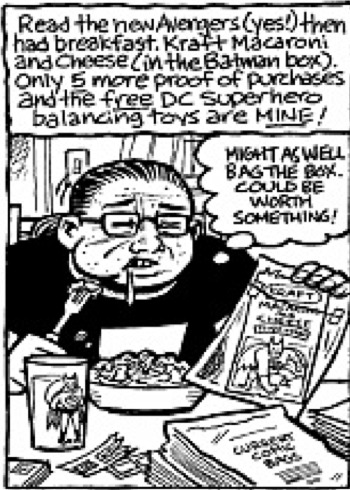
On surface level, a lot of Josh’s behaviors reflect the overconsumption aspects in toxic fandoms, the need to spend everything to finish a collection, even if it is something they don’t even like. But I also think that its a way for Josh to have something that he doesn’t have a lot of in his life: control.
As much as Josh owns and collects, as much as he knows about trivia, he is unable to control how other people view him, which becomes more of an emphasis when taken into account that Josh (next to Jerry) is usually bullied the most. He has no control over the club, as Bill constantly reinforces his status through making sure that he gets to decide how the day is planned and what they are going to do. No matter how much he knows about comics and sci fi, he will never get hired at Joes because Joe sees him just as another source to get money out of.
I think the collecting allows Josh to have some say in how things go, same with his writing of superhero fan fiction, it gives him the ability to decide what will happen without being questioned.
*This can also apply to how he treats people in customer service, considering how he talks to them and how he treated the seller from As Seen on TV. These people can't lash out because if they do, they will get fired, and only exist to Josh as someone who he can tear into without consequence.
In this case, it is probably why Josh never got better as a writer, along with his own entitlement, he probably saw any criticism as an attack on him, and he already gets shit on daily by pretty much everybody. The only way he could find a way around this was to force people to have to deal with it out of spite, which can be seen in the epilogue as he goes on a whole speech on how when he finally gets in with the desired group of people, he can finally force people to accept his work as canon.
Josh’s parents also play a role when it comes to his consumerism and how he interacts with people. Although they are never seen, the pieces of information given (Josh having the most money to spend on memorabilia, their willingness to let him keep spending money and continue his terrible diet, giving him punishments for his behavior but still being very forgiving as they still let him interact with the club even though that’s usually how he gets into trouble) give more context for why Josh is so quick to anger and entitled, he is used to getting what he wants with little to no resistance which is something that Bill constantly challenges.
Though there is definitely a shift in this behavior after the events in This Fan, This Monster. Out of all the characters that get yelled at, I would say that Josh’s is one of the worst. You can see that his parents have reached their breaking point, and possibly have a lot of built up resentment towards Josh that is finally being let loose as they tell him they would rather be dead and blame him for his mothers heart attack.(as well as their own regrets of how they raised Josh being blamed on him) It is a personal attack that is directed towards Josh, and this is one of the only times that he doesn’t respond with hostility.
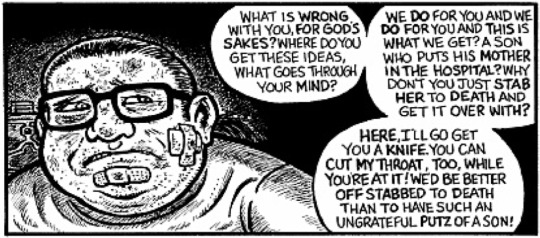
The one thing that Josh lacked which he needed the most to improve was some degree of self-reflection, as well as needing to accept that he can be wrong. The epilogue shows he did neither of these and instead doubled down. He may have gained more power, but has not gained any sense of self or respect to others, and will probably be treated as just another disposable piece in the comic industry.
138 notes
·
View notes
Text
* this is a ramble about the fem eltingville club and is not art related. Sorry if sentences don’t make sense, I just wrote what I was thinking fast lol*
Since I like the idea of the eltingville club being girls, I’ve been thinking of the epilogue- esp for Pete( I’m not changing the names to “fem” ones, not interested). Yeah, women can be disgusting for their own reasons that have nothing to do with misogyny- but when it comes to the p*rn industry, Pete is a double-sided blade y’know. Yes, she would still use mofo to pick up vulnerable girls, but it’s a bit more sinister in my own idea as I think that the girls going into mofo would think they are safe with Pete. Whether Pete is aware of it or not, she does not try to understand the exploitation the women are going through. These women will only realize that Pete is terrible when they try to get her to report against one of the men of mofo- which Pete would brush off as “ well he’s a good guy…you signed up for this….its your fault”. Pete, along with Josh and bill( this is the epilogue, so Jerry was able to overcome her internalized misogyny/ sexist beliefs) do not align themselves with the struggles that women go through. They still strive for male validation- and with Pete mostly having brothers, she does not allow herself to be seen as “girly”. The double sided blade part comes into the disrespectful comments that the men she works with make at her dispense. The men only see her as an object and don’t care if she is like them. I could see Pete being jaded to the hardcore stuff that mofo produces, mostly due to her not wanting to be seen as “sensitive” or “bitchy”. She wants to be seen as the “cool girl” who’s okay w/ extreme gore and r*pe of women, even when the plot is crap. She was most likely hired not only for her knowing multiple horror porn films, but also due to her being entertaining to butchie. I can imagine her going home after working very drained with dealing with people who do not respect her, and most likely knows that she is there just so the men can bring in more girls.
As for Josh and bill, they are more likely the same as their masc counterparts, but I believe that bill would be an hardcore incel ( I hate the term femcel) who’s closeted. I could see Josh also on the incel pathway, but not as much as bill. In general, Josh is the second most redeemable and can change for the better like Jerry has.
As for Jerry, exactly the same- just as an open lesbian ( shocker I know coming from me). I don’t see her as becoming very feminine, but is more so comfortable. In terms of how comfortable the club is with their sexuality- they all know they are attracted to girls. Pete and Jerry being the most open about it in the epilogue ( Pete being objectifying since before due to the content she consumed ), Josh being quiet about it due to feeling like no one can find her attractive, and bill being outwardly homophobic to distract from the fact that she ogles at the women at cons or wherever. They all (Jerry when she was younger) are okay making raunchy comments towards women due to not being seen as serious by others and through roleplay.
* lesbian part is a hc for the girls* *a hc for a hc*
39 notes
·
View notes
Text
One of the best scenes from The Eltingville Club (and what it says about Bill)
So I have been re-reading The Eltingville Club comic a lot, and even though there are a wide variety of expressions drawn in the comics, there is one specific panel that I keep thinking about.
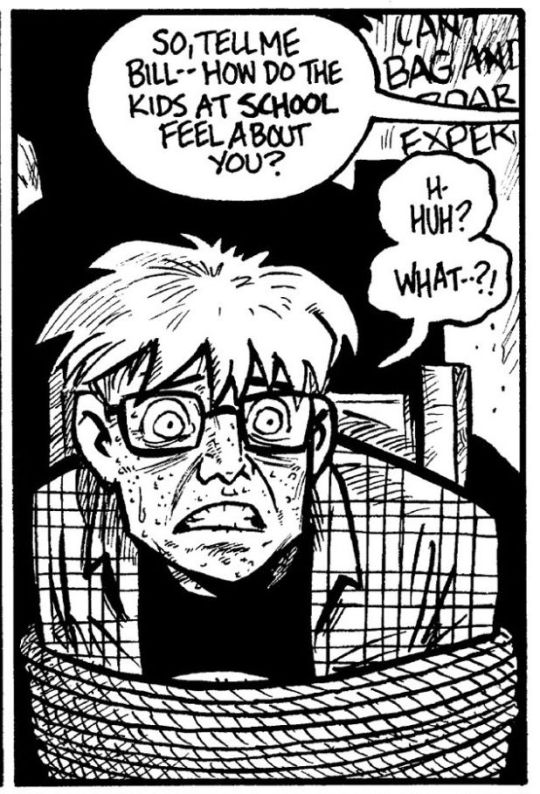
And it's this panel from The Intervention. I think about this for a handful of reasons, but the first one that comes to mind is that out of all of Bills other expressions he makes in the comic series, this one is one of the most realistic and genuine.
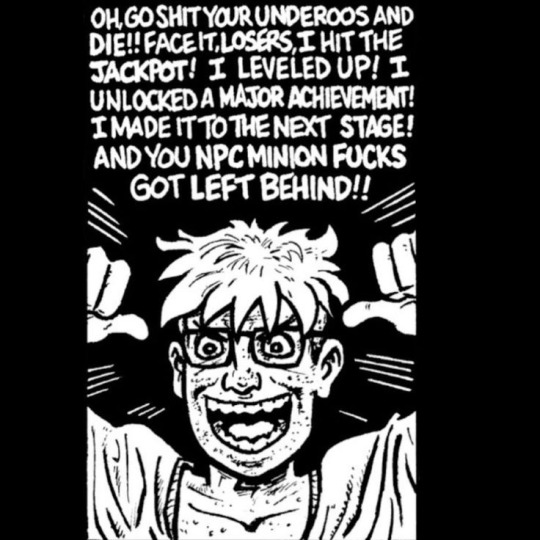
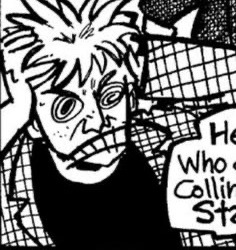
Bill's facial expressions usually just fall into similar categories of being a smug asshole and enraged. The way they are drawn usually lean into cartoonish or detailed and grotesque.
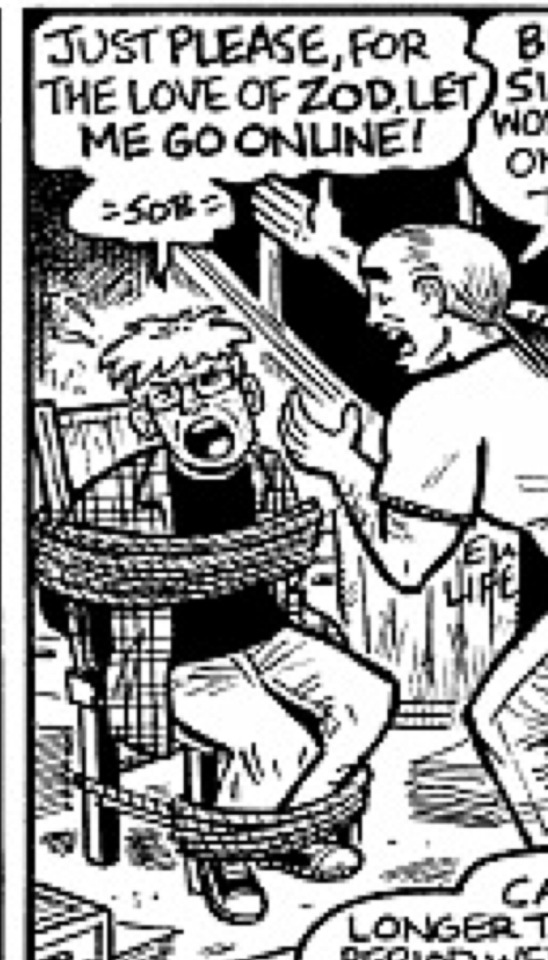
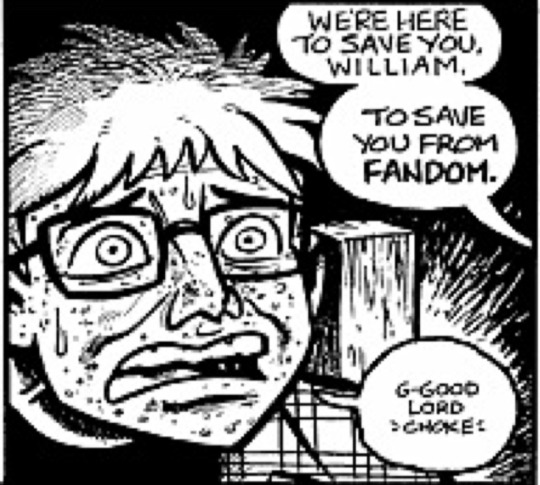
Points where he is upset are usually played for comical effect in the sense that the audience is laughing at how pathetic he is. In comparison to other contexts where Bill is having a kneejerk reaction to whatever is happening, this is after hours of being worn down by mandom and the focus going to the things he owns. Being asked about his personal life both catches him off guard, and terrifies him.
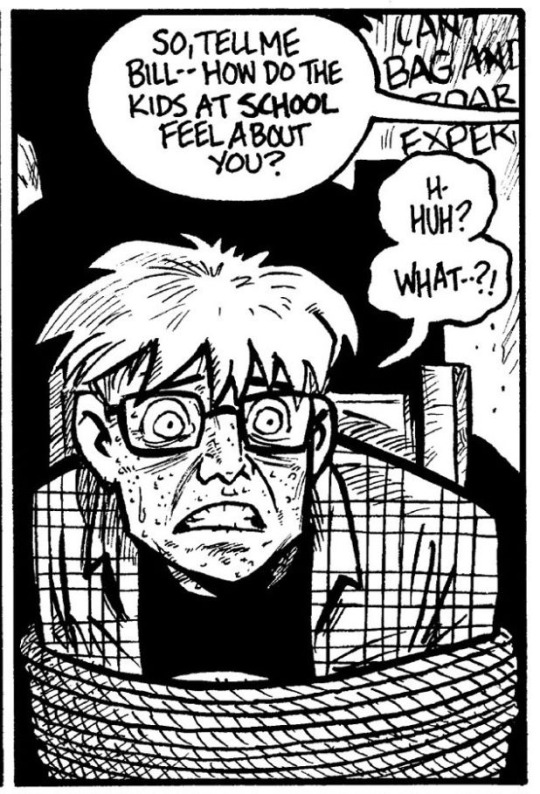
You can see that crack of vulnerability in him in this scene, and it is portrayed in an extremely real way, both because of how good the art is, and how grounded the scene later gets in comparison to previous events.
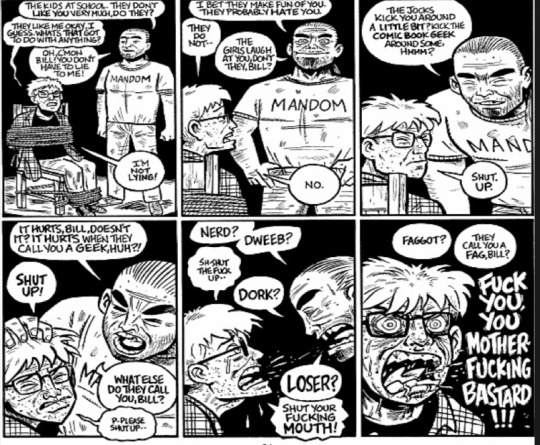
When Bill gets interrogated to where he explodes, his behavior also contrasts previous comics. In other comics, whenever Bill was pissed off, he would immediately wail on whoever insulted him, but here he can’t. He is physically unable to and just collapses into tears, all of that stemming from this panel.
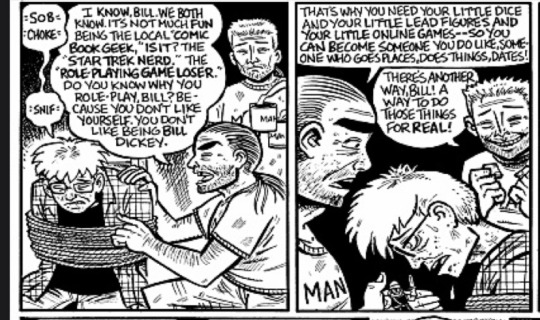
It both gives a lot of insight into his character in such a brief moment, while also being really engaging and a shift from the previous tone of earlier comics.
311 notes
·
View notes